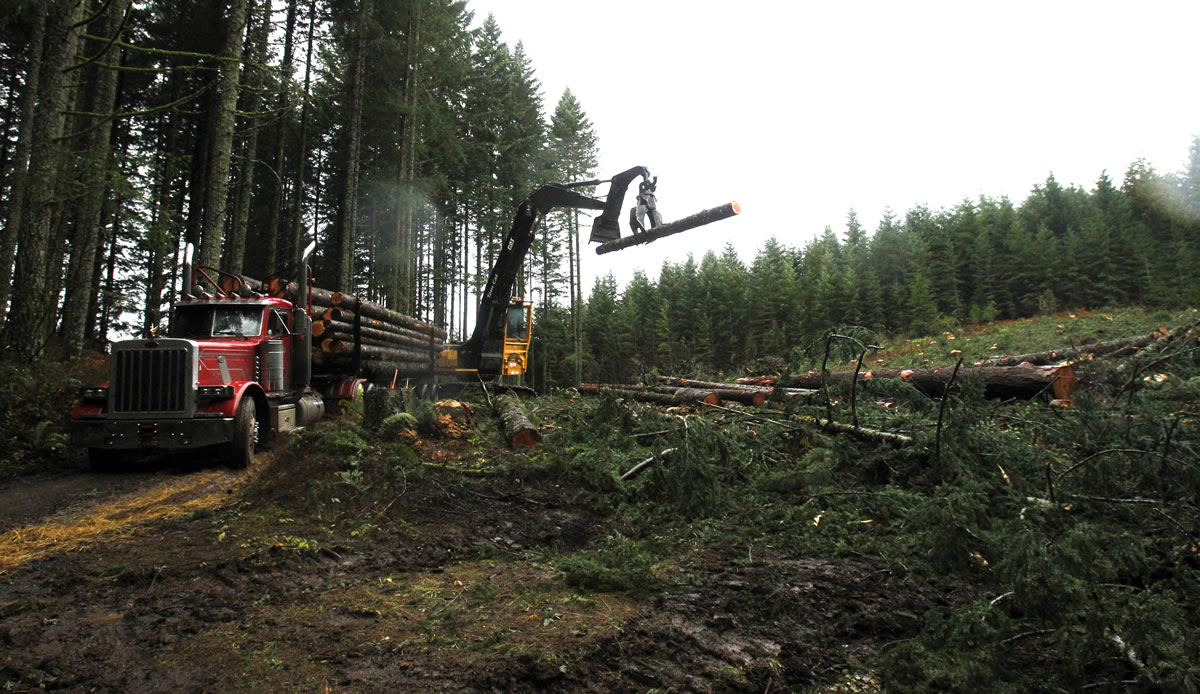GRANTS PASS, Ore. — The U.S. Supreme Court will decide whether to switch gears on more than 30 years of regulating the muddy water running off logging roads into rivers.
At issue: Should the U.S. Environmental Protection Agency keep considering it the same as water running off a farm field, or start looking at it like a pipe coming out of a factory?
The case being heard today in Washington, D.C., was originated by a small environmental group in Portland, the Northwest Environmental Defense Center.
It sued the Oregon Department of Forestry over roads on the Tillamook State Forest that drain into salmon streams. The lawsuit argued that the Clean Water Act specifically says water running through the kinds of ditches and culverts built to handle stormwater runoff from logging roads is a point source of pollution when it flows directly into a river, and requires the same sort of permit that a factory needs.
“We brought this out of a perceived sense of unfairness,” said Mark Riskedahl, director of the center. “Every other industrial sector across the country had to get this sort of permit for stormwater discharge,” and the process has been very effective at reducing pollution.
The pollution running off logging roads, most of them gravel or dirt, is primarily muddy water stirred up by trucks. Experts have long identified sediment dumped in streams as harmful to salmon and other fish.
The center lost in U.S. District Court in Portland, but won in the 9th U.S. Circuit Court of Appeals in San Francisco. The Oregon Department of Forestry and Georgia Pacific-West appealed to the Supreme Court, and 31 states threw in with them.
Industry seeks status quo
The timber industry wants to keep things the way they are, with no permits for roads built under a system of best management practices. They contend requiring permits would cost timberland owners and logging companies too much money and thousands of jobs.
“EPA has been absolutely clear since 1976 in its rules and briefs explaining those rules and what it has done,” said timber industry lawyer Timothy Bishop.”Never once has it required a permit for discharges from forest service roads. It has been absolutely clear that is a bad idea.”
The Obama administration petitioned the Supreme Court not to take the case, arguing that while the appeals court ruling was wrong, Congress and EPA were taking steps to correct the situation already.
Last May, EPA formally proposed to revise stormwater regulations to say logging roads don’t need the point-source pollution permits that factories must get, and has gone ahead despite the court’s decision to take the case. Congress enacted a temporary continuation of the status quo.
Jeffrey Fisher, a professor at Stanford Law School and co-director of its Supreme Court Litigation Clinic, is arguing the case for environmentalists. He said the court took the case after 31 states joined the timber industry in petitioning for appeal.
He said the Clean Water Act requires industrial activity to get a permit for stormwater that runs through ditches, pipes and channels.
“Industrialized logging operations with all the heavy machinery that takes place on lands at issue here is, we think, pretty clearly industrial in nature,” he said. “That’s the end of the case, right there.”
Changes ‘costly’
Bishop said regulations developed by EPA and enforced by the states without permits have done a great job since 1976, and changing them to require EPA to issue permits would cost too much in jobs and money.
The National Alliance of Forest Owners commissioned studies that concluded new permits would cost landowners and logging operators nationwide upwards of $1.1 billion in administrative costs.
Riskedahl said the timber industry has grossly exaggerated the costs. Each state can issue blanket permits to cover national forests, state forests, and private timberlands, as well as the logging and trucking companies that operate on them. It would be similar to the permit the Oregon Department of Transportation already has for state highways. Cleaning up the water requires low-tech solutions, such as putting roads on ridges, so ditches flow to the forest floor, instead of rivers.
“There is a cost to corporate entities to comply with the permits. The result is pollution reduction and jobs for local companies (working on logging roads),” he said.
In legal terms, Bishop said the three judges from the 9th Circuit ignored court rules that they should defer to the expertise of the regulating agency, EPA, which has consistently found logging road runoff is a non-point source of pollution, Bishop said. In 1976 it adopted the Silvicultural Rule, exempting logging from point-source permits.



